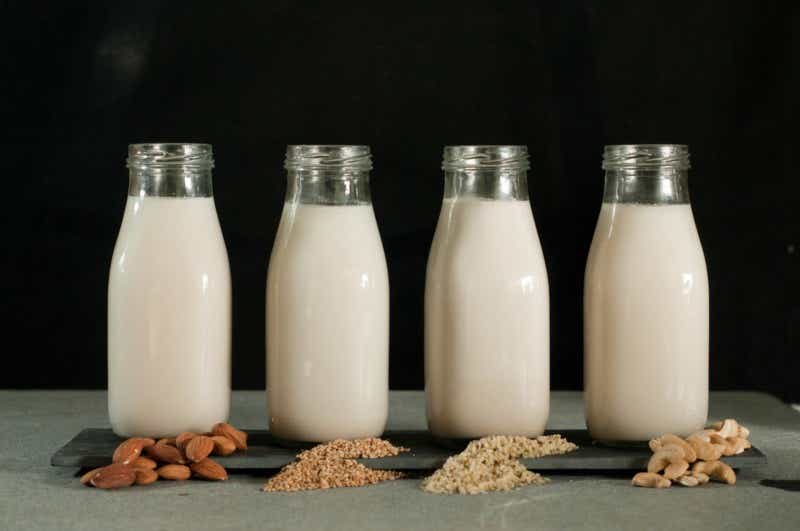From oat milk to almond milk
Oat milk. Almond milk. Cashew milk. Soy milk. There are so many milk alternatives out there today… and it can be tough to figure out what types might be best for you. Enter our favorite healthy eating expert Dr. Mark Hyman, author of Food: What the Heck Should I Cook?. He’s here to help us understand why these milk alternatives have become so popular in recent years — and which types might be the most beneficial.
Katie Couric: It used to be that, at a coffee shop, you had a choice between milk or cream. Now? It’s all that — and so much more. Before we go into the various types of milk substitutes and their benefits (or lack thereof), can you tell us a bit about the rise in alternatives to milk? What spurred this trend?
Dr. Mark Hyman: Milk alternatives are everywhere. An important reason behind this trend is the growing awareness that many people don’t digest dairy well. Sixty to 70 percent of the world’s population is lactose intolerant. This is a deficiency of the enzyme required to break down the sugar (lactose) in cow’s milk. Consumers are more conscious about the way food impacts how they feel.
In my practice, dairy affects my patients in many ways related to inflammation: gastrointestinal issues such as irritable bowel or reflux, asthma and sinus problems, eczema and acne. People understand that dairy alternatives can provide the culinary benefits without the risks. There is also increasing concern about factory farming of animals, and its impact on animal welfare, the overuse of antibiotics and hormones, climate change and environmental degradation. These are among the main reasons we see a rise in milk alternatives.
Now, can you tell us about the different types of milk substitutes?
Soy milk was the first dairy alternative, but competitors have flourished in the wake of concerns about soy, glyphosate (the herbicide used on soybeans and its potential estrogenic effects. Today almond, coconut, cashew, hazelnut, hemp, macadamia and oat milk are found in most stores. In the past decade we’ve seen a renaissance non-dairy milks. Large food companies are buying up the small milk alternative companies following the trend away from traditional dairy.
Are milk substitutes actually healthy? Are they any better or worse for us than regular milk? What should we watch out for with these dairy alternatives?
Just because it’s natural or from beans or nuts doesn’t mean it’s healthy. Most versions of non-dairy milks are loaded with sugar, gums and thickeners. Even the organic, unsweetened versions contain additives designed to make nut and rice water look and taste like cow’s milk.
One of these additives is carrageenan, a thickening agent that’s used in ice cream, yogurt, cottage cheese, and other dairy products. It’s derived from seaweed, but it’s no innocent sea vegetable. It’s an irritant that causes cancer in lab rats. In humans, carrageenan has been associated with ulcers, leaky gut, inflammation and even autoimmune disease. It has no nutritional value, and yet the FDA approves its use in baby formula. It should be avoided completely. Other thickeners may not be as problematic but are still cause for concerns such as the gums — xanthan gum, guar gum, locust bean gum — and anything else that sounds like it was made in a lab.
You’re not losing much by skipping these mass-produced drinks. In fact, many milk alternatives are so bereft of nutrients that they have to be supplemented with added vitamins and minerals to appear even slightly beneficial. Only soy milk has a meaningful amount of protein. But soy milk comes with its own problems, like a hefty amount of phytoestrogens, which may mimic estrogen in the body when consumed in excess. Even worse, many varieties of soy milk are made soy protein isolates linked to cancer rather than whole beans. A little soy may be fine, but choose organic, non-GMO to avoid glyphosate which has been linked to cancer.
When it comes to choosing between the different milk substitutes, what type would you recommend we try out?
I usually recommend making your own milk substitutes. It’s easy — just soak a bag of almonds, hazelnuts, or cashews in a bowl overnight to soften them up, and then blend them with water and a little vanilla extract. Soaking them also unlocks their nutrients, which makes them easier for your body to absorb. But make small batches; the milk doesn’t keep for long (more than a week in the fridge). You can also make your own coconut milk.
If this isn’t possible, there are a few brands of non-dairy milks that are pretty clean. You just have to look at the ingredients. Stick with hemp, almond, macadamia or cashew milks but always choose unsweetened and make sure they have no carageenan.
Finally, what is your preferred milk alternative, and why?
One of my personal favorites is macadamia milk. It’s really creamy and tasty. Macadamia nuts contain beneficial monounsaturated fats that support metabolic and cardiovascular health and nutrients that support brain health, so overall they make a very nutrient-dense milk substitute.
Follow Dr. Mark Hyman on Instagram, Twitter, and Facebook, and check out his books on Amazon or your local books retailer.
This originally appeared on Medium.com
Books purchased through this link may earn us affiliate revenue.









